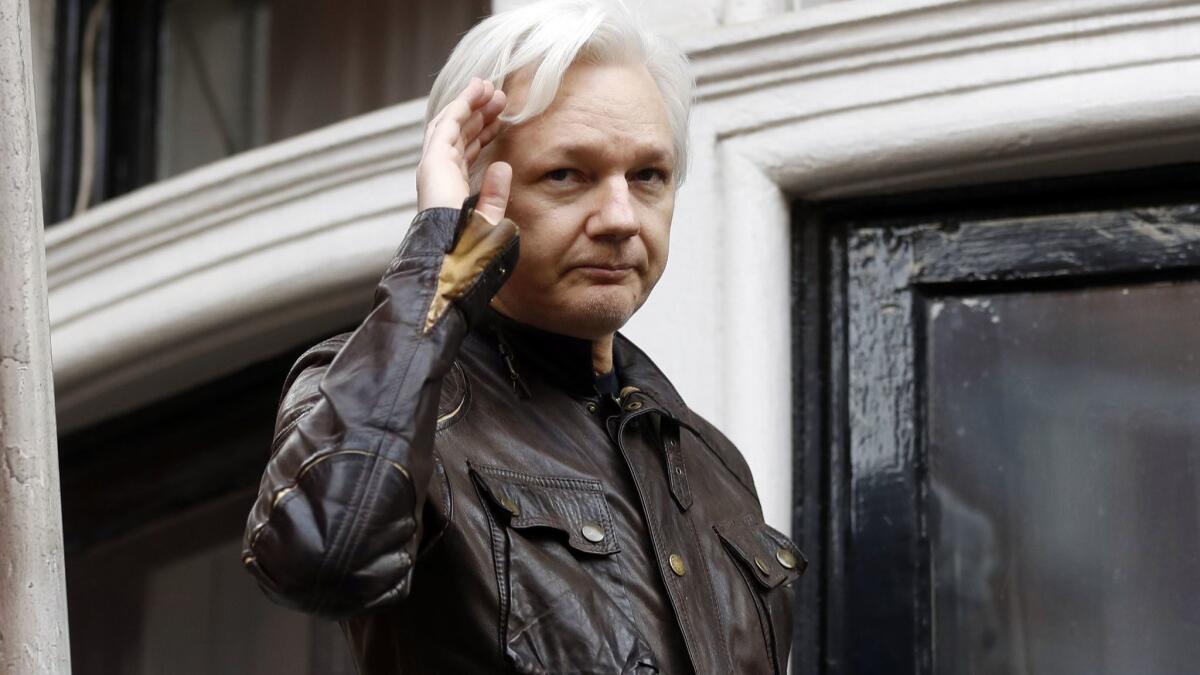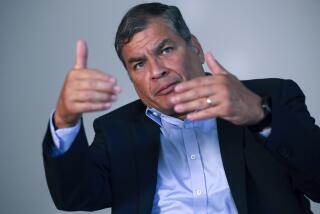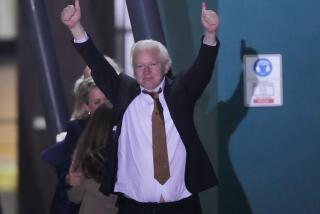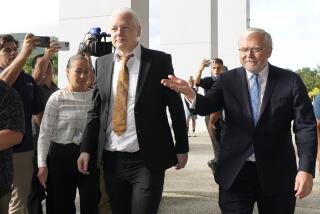Increasingly frustrated, Ecuador says itās time for Julian Assange to finally leave embassy

Reporting from LONDON ā Ecuadorās president said Thursday that the British government had given written assurances that WikiLeaks founder Julian Assange would not be extradited to face the death penalty abroad if he leaves his London embassy hideout, where heās been holed up for more than six years.
In the clearest sign yet that the Australian activist might eventually face the U.S. justice system, President Lenin Moreno said he was eager to bring an end to Assangeās long residency inside his countryās embassy and had been working with British authorities to make that happen.
āI am not happy with Assangeās presence in the Ecuadorean Embassy.ā¦ It seems to us six years is too much,ā Moreno said in a radio interview from the presidential palace in Quito, the nationās capital.
A āpath has been madeā for Assangeās departure, Moreno said, stopping short of saying his government would be open to forcibly ejecting Assange if he refuses to leave on his own.
Assange has been living in the Ecuadorean Embassy in London since June 2012, when he knocked on the door of the building in the upmarket Knightsbridge neighborhood and claimed political asylum. At the time, he was facing accusations of raping two women in Sweden and had lost his fight against extradition days earlier.
The charges have since been dropped by Swedish authorities, but Assange has refused to step outside his embassy confines for fear of being detained. British authorities could arrest him for breaking his bail conditions, though he would be unlikely to spend more than a year in prison.
Assangeās chief concern is that once in custody, he could be extradited to the U.S. to face charges for his organizationās role in the release of classified government documents.
Although the U.S. has never publicly acknowledged that it has charged Assange, Morenoās comments come three weeks after federal prosecutors in Virginia accidentally revealed, in court documents from an unrelated case, that he is facing criminal charges that were filed under seal.
Itās unclear what charges have been filed, but U.S. officials have considered filing charges since he first began releasing reams of classified information through WikiLeaks.
Such a step could have implications for 1st Amendment protections because courts have long recognized the rights of journalists to publish secret government information.
More recently, Assange has been under scrutiny in the investigation led by special counsel Robert S. Mueller III, who is probing whether anyone from President Trumpās campaign conspired with Russians to influence the U.S. 2016 election.
During the campaign, WikiLeaks released stolen Democratic Party emails that had been hacked by Russian military intelligence officers, according to an indictment this year. Prosecutors did not accuse WikiLeaks of knowing that the emails were being provided by the Russians, who used the fictitious persona āGuccifer 2.0ā to communicate online.
Mueller is also examining whether Roger Stone, a longtime political advisor, or other Trump associates communicated or coordinated with WikiLeaks. Stone has denied any links to the anti-secrecy organization.
At the time Assangeās organization was releasing Democratic Party emails, Trump proclaimed, āI love WikiLeaks!ā
But WikiLeaks has also continued to be a thorn in the side of U.S. officials and Trumpās administration has generally taken a tougher line against the organization, more so than President Obama before him.
In his interview Thursday, Moreno revealed that he has been in conversation with the British government since he took office last year, asking it to āguarantee a respect for Assangeās human rights, to guarantee his life.ā
Moreno said he received a letter from the British government explaining it is against the U.K.ās constitution to transfer a prisoner to a country with the death penalty or āsomewhere where his life is in danger.ā
A spokesman for Britainās Home Office said it has a long-standing policy of neither confirming nor denying any extradition proceedings.
During the last six years, Assange has made a few brief appearances on the balcony of the embassy. Otherwise, heās stayed out of sight, remaining indoors with his pet cat.
But there have been signs for months that the situation was becoming increasingly untenable to both British and Ecuadorean authorities.
In March, Moreno announced he was cutting off Assangeās internet access because he had breached a commitment not to jeopardize relations between Ecuador and other countries by voicing his political opinions using social media.
In October, those internet restrictions were partially lifted but Assange was hit with a set of āhouse rulesā that included banning him from making political statements, cleaning his bathroom and taking better care of his cat.
He responded by suing the embassy for āviolating his fundamental rights.ā
In June, Sir Alan Duncan, a minister of state in Britainās Foreign Office, said the government was becoming āincreasingly concernedā about Assangeās health.
āIt is our wish that this is brought to an end, and we would like to make the assurance that if he were to step out of the embassy, he would be treated humanely and properly. The first priority would be to look after his health, which we think is deteriorating.ā
Barry Pollack, a Washington-based lawyer for Assange, expressed concern Thursday that Ecuador might be considering revoking Assangeās asylum, which has cost the South American nation millions.
āThe suggestion that as long as the death penalty is off the table, Mr. Assange need not fear persecution is obviously wrong,ā Pollack said. āNo one should have to face criminal charges for publishing truthful information. Since such charges appear to have been brought against Mr. Assange in the United States, Ecuador should continue to provide him asylum.ā
Special correspondent Boyle reported from London and Times staff writer Megerian from Washington. Special correspondent Chris Kraul in Bogota, Colombia, contributed to this report.
More to Read
Sign up for Essential California
The most important California stories and recommendations in your inbox every morning.
You may occasionally receive promotional content from the Los Angeles Times.











